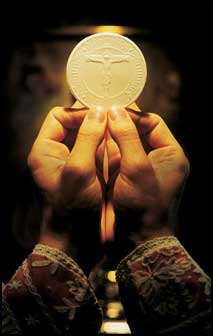The Eucharist Crushes the Barriers of My Heart
When he had given thanks, he broke it, and said, “This is my body which is for you (emphasis mine). Do this in remembrance of me.â€
1 Cor. 11:24
Great receivers love grace. Grace being Jesus in them to live the Christian life in joy, holiness, and power. In the Holy Eucharist, Jesus gives us sanctifying grace to strengthen us to live the Christian life. Great receivers know that Christ as grace is present in the Lord’s Supper. They hunger to partake. They know that Christ is available now by the power of the Holy Spirit in the elements of bread and wine. In his Body and Blood, Christ blesses them with physical, emotional, and spiritual renewal. Great receivers run to the Eucharist for they know that there at the altar they will meet Christ.
In the sacraments, we acknowledge in faith that whatever happens to Christ also happens to us. Baptism plunges us in to the waters of his vicarious human life, uniting us and identifying us with his humanity. The Lord’s Supper feeds us with Christ, participating in his perfect human life, death, resurrection and ascension in the bread and wine.
Leonard J. Vander Zee, Christ, Baptism and the Lord’s Supper(Downers Grove, IL: InterVarsity, 2004), 51.
To choose Jesus is to allow grace to crush the barriers in my heart. Those big barriers of trust in my own abilities and self-confidence need to collapse. If my trust is in myself, I am self-centered, not Jesus-or Eucharist-centered.”
Tadeusz Dajczer, The Mystery of Faith: Meditations on the Eucharist (Orleans, MA: Paraclete Press, 2009),17.
HT: Jesus Creed


